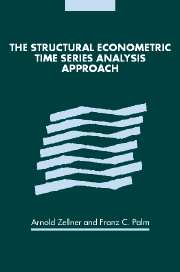Book contents
- Frontmatter
- Contents
- List of contributors
- Acknowledgments
- Introduction
- Part I The SEMTSA approach
- Part II Selected applications
- Part III Macroeconomic forecasting and modeling
- 13 Macroeconomic forecasting using pooled international data (1987)
- 14 Forecasting international growth rates using Bayesian shrinkage and other procedures (1989)
- 15 Turning points in economic time series, loss structures, and Bayesian forecasting (1990)
- 16 Forecasting turning points in international output growth rates using Bayesian exponentially weighted autoregression, time-varying parameter, and pooling techniques (1991)
- 17 Bayesian and non-Bayesian methods for combining models and forecasts with applications to forecasting international growth rates (1993)
- 18 Pooling in dynamic panel data models: an application to forecasting GDP growth rates (2000)
- 19 Forecasting turning points in countries' output growth rates: a response to Milton Friedman (1999)
- Part IV Disaggregation, forecasting, and modeling
- Subject index
- Author index
- References
15 - Turning points in economic time series, loss structures, and Bayesian forecasting (1990)
Published online by Cambridge University Press: 24 October 2009
- Frontmatter
- Contents
- List of contributors
- Acknowledgments
- Introduction
- Part I The SEMTSA approach
- Part II Selected applications
- Part III Macroeconomic forecasting and modeling
- 13 Macroeconomic forecasting using pooled international data (1987)
- 14 Forecasting international growth rates using Bayesian shrinkage and other procedures (1989)
- 15 Turning points in economic time series, loss structures, and Bayesian forecasting (1990)
- 16 Forecasting turning points in international output growth rates using Bayesian exponentially weighted autoregression, time-varying parameter, and pooling techniques (1991)
- 17 Bayesian and non-Bayesian methods for combining models and forecasts with applications to forecasting international growth rates (1993)
- 18 Pooling in dynamic panel data models: an application to forecasting GDP growth rates (2000)
- 19 Forecasting turning points in countries' output growth rates: a response to Milton Friedman (1999)
- Part IV Disaggregation, forecasting, and modeling
- Subject index
- Author index
- References
Summary
Introduction
In a letter commenting on a draft of Zellner (1987), Barnard (1987) wrote, “I very much liked your emphasis on the need for sophisticated, simple model building and testing in social science.” Apparently, Barnard and many other scientists are disturbed by the complexity of many models put forward in econometrics and other social sciences. And indeed we think that they should be disturbed since not a single complicated model has worked very well in explaining past data and in predicting as yet unobserved data. In view of this fact, in Garcia-Ferrer et al. (1987) and Zellner and Hong (1989), a relatively simple, one-equation model for forecasting countries' annual output growth rates was formulated, applied, and found to produce good forecasts year by year, 1974–84 for eighteen countries. This experience supports Barnard's and many others' preference for the use of sophisticatedly simple models and methods. See Zellner (1988) for further discussion of this issue.
In the present chapter, we extend our previous work to consider the problem of forecasting future values and turning points of economic time series given explicit loss structures. Kling (1987, pp. 201–4) has provided a good summary of past work on forecasting turning points by Moore (1961, 1983), Zarnowitz (1967), Wecker (1979), Moore and Zarnowitz (1982), Neftci (1982), and others. In this work there is an emphasis on the importance and difficulty of forecasting turning points.
- Type
- Chapter
- Information
- The Structural Econometric Time Series Analysis Approach , pp. 506 - 527Publisher: Cambridge University PressPrint publication year: 2004
References
- 1
- Cited by



